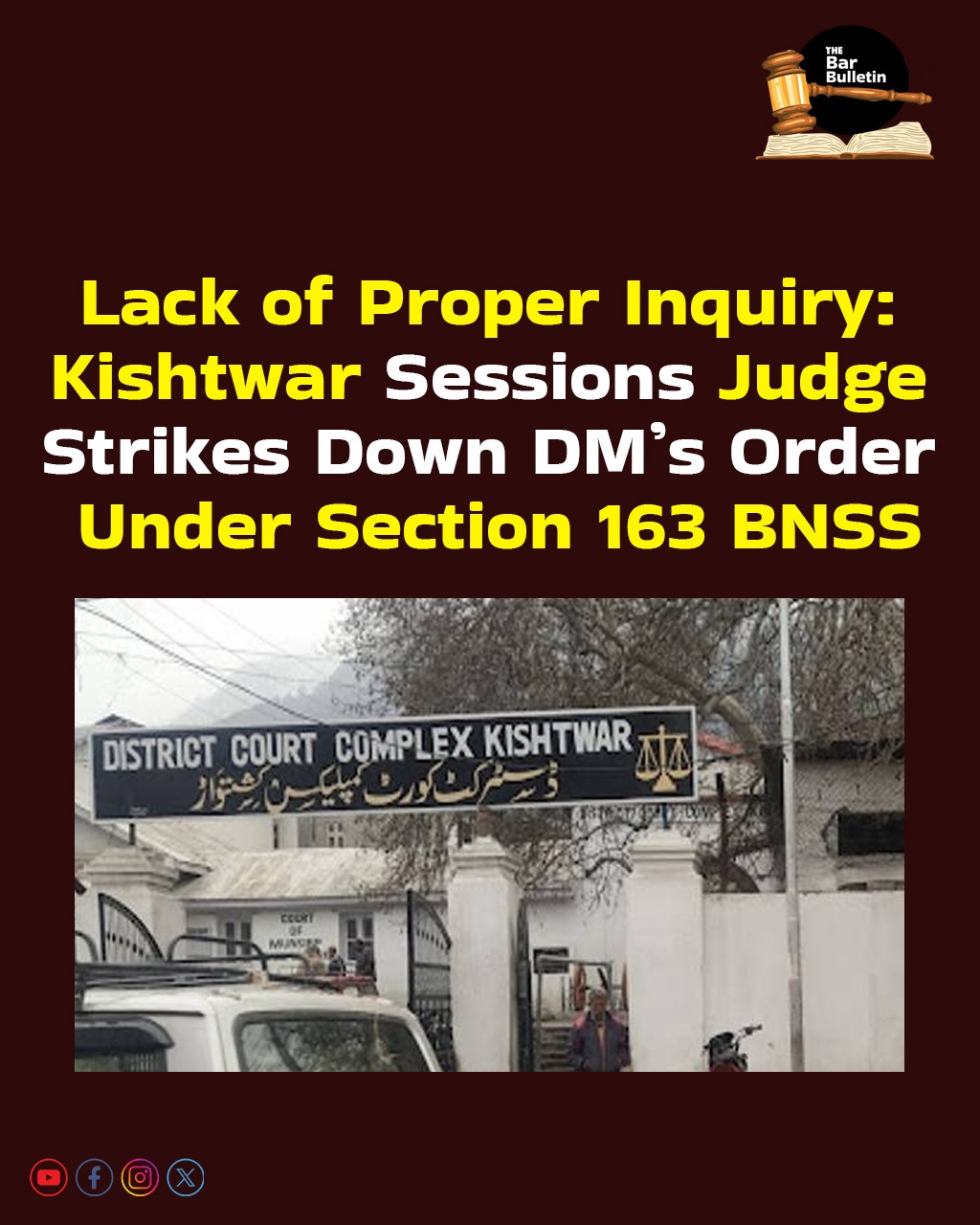The Principal Sessions Judge Kishtwar set aside an order passed by the District Magistrate under Section 163 BNSS (corresponding to Section 144 Cr.P.C) dated February 10, 2025, observing that the impugned order had been passed in a very arbitrary, illegal and negligent manner without following the mandate of law. Judge Sudhir K Khajuria held that the order was passed in a mechanical and perfunctory manner without conducting proper inquiry as mandated by law.
The revision petition challenged the District Magistrate’s order on grounds that the impugned order was passed in a mechanical and perfunctory manner and that the order was issued by the respondent in haste, as it did not show any urgency justifying the invocation of Section 163 of BNSS. The petitioner argued that the respondent invoked Section 163 BNSS without any inquiry and without clarifying as to how did the respondent make his mind for invoking Section 163 BNSS. It was further submitted that the power under Section 163 BNSS could not be exercised to suppress legitimate expression of opinion, grievance, or the exercise of democratic rights, such as in the present case where the petitioner demanded free electricity from the Government, and that such power could only be used when a present danger existed, and the danger must be of an emergency nature, whereas in this case, no such emergency was present. The petitioner further contended that the order did not contain material facts and the power was not exercised in a bona fide and reasonable manner, with no emergent situation having arisen, making the order mala fide.
The Court extensively analyzed the legal framework, noting that Section 163 of BNSS 2023 corresponds to Section 144 of Cr.P.C which was applicable prior to the coming into force of BNSS 2023 and that Chapter XI of BNSS 2023 deals with public order and tranquility. Relying on Supreme Court judgments in Anuradha Bhasin v. Union of India, AIR 2020 SUPREME COURT 1308, the Court held that such power can only be exercised in urgent cases of nuisance or apprehended danger, based on sufficient material and after a careful inquiry. It emphasized that this power could not be used arbitrarily or to suppress legitimate expression of opinion, grievance, or democratic rights, and must not be invoked without clear grounds showing a real threat to public safety. The Court specifically noted that Section 163 is contained in Chapter XI which is divided into 4 parts: Part (A) dealing with unlawful assemblies (Sections 148-151), Part (B) dealing with public nuisance (Sections 152-162), Part (C) dealing with urgent cases of nuisance and apprehended danger (Section 163 only), and Part (D) dealing with disputes relating to immovable property (Sections 164-167).
Upon scrutiny of the record produced by the respondent containing total number of 7 pages, the Court found that whole of the proceedings were initiated as well as concluded by the respondent in one day i.e on 10.02.2025. The proceedings were initiated on the basis of a letter bearing No. 75/JC/TK Submitted by Tehsildar Kishtwar to District Magistrate which was further based on the report of field staff which had been submitted wide No. NTK/607 dated 10.02.2025. It was critically noted by the Court that the report by Tehsildar Kishtwar was submitted to the District Magistrate in a stereotyped manner, following the District Magistrate’s own verbal directions. This created a vicious circle of information flow that began and ended with the same person, which the Court observed was never intended by the lawmakers when Section 163 was incorporated in Chapter XI of BNSS 2023.
The Court found multiple deficiencies in the inquiry process, noting that if any government officials had faced obstruction in discharging their public functions, there should have been a report from them to the revenue officials or some other concerned agency, yet not a single person was examined by the revenue officials. Despite allegations of obstruction in the installation of smart electricity meters at various places, there was no official record of any such past occurrence. The Court further observed a fundamental disconnect between the purported inquiry and the actual order, stating that there appeared to be no connection between the reasons mentioned in the impugned order and those reported by the Tehsildar. While the Tehsildar’s report referred to obstruction of government officials in performing their duties, the impugned order made no mention of this and only stated that some people, under the pretext of demonstration, were trying to attract gatherings. The order mentioned unauthorised assemblies and reasonable apprehension of occurrence of any untoward incident which can escalate into public disturbance and was an imminent threat to public peace and public safety but made no reference to the specific issues raised in the Tehsildar’s report.
Although the order was passed ex-parte, the Court noted that even such an order had to be issued after forming an opinion as mandated under Section 163 BNSS, since an opinion on any fact could not be formed without conducting some inquiry. The Court found that from the perusal of the impugned order, it was clear that no opinion had been formed based on any inquiry. It concluded that the documents produced appeared to have been managed merely to show that the order dated 10.02.2025 was passed in compliance with legal requirements, but detailed scrutiny revealed that the mandate of law was not followed. The Court further distinguished between an inquiry and an inquiry report, explaining that a report can only be prepared after an actual inquiry, whereas in this case, the letter dated 10.02.2025 bearing No. 75/JC/TK was presented as an inquiry despite no real inquiry having been conducted.
Conclusively, the impugned order was held to have been passed in an arbitrary, illegal, and negligent manner, without the mandate of law being followed. Accordingly, the order dated 10.02.2025 passed by the respondent was set aside, and the revision petition was disposed of.
Appearances:
Petitioner: Mr. Safder Ali Shoket, Advocate
Respondent : PP for the state



